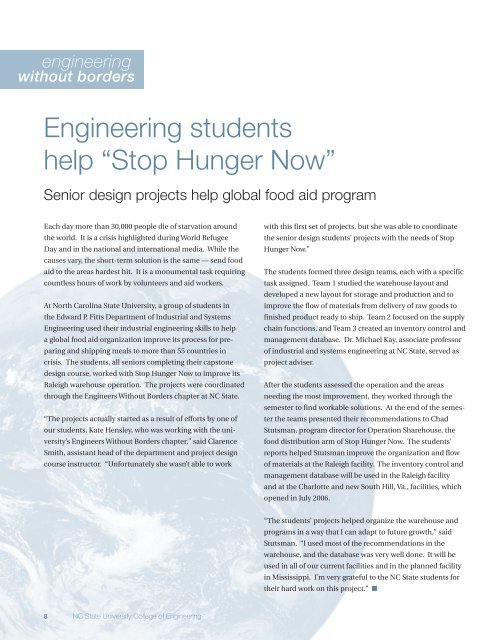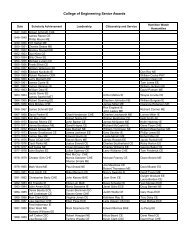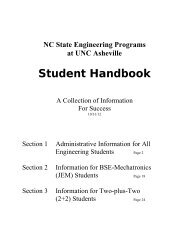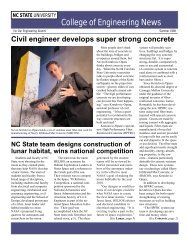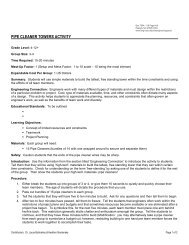FRONTLINE - College of Engineering - North Carolina State University
FRONTLINE - College of Engineering - North Carolina State University
FRONTLINE - College of Engineering - North Carolina State University
Create successful ePaper yourself
Turn your PDF publications into a flip-book with our unique Google optimized e-Paper software.
engineering<br />
without borders<br />
<strong>Engineering</strong> students<br />
help “Stop Hunger Now”<br />
Senior design projects help global food aid program<br />
Each day more than 30,000 people die <strong>of</strong> starvation around<br />
the world. It is a crisis highlighted during World Refugee<br />
Day and in the national and international media. While the<br />
causes vary, the short-term solution is the same — send food<br />
aid to the areas hardest hit. It is a monumental task requiring<br />
countless hours <strong>of</strong> work by volunteers and aid workers.<br />
At <strong>North</strong> <strong>Carolina</strong> <strong>State</strong> <strong>University</strong>, a group <strong>of</strong> students in<br />
the Edward P. Fitts Department <strong>of</strong> Industrial and Systems<br />
<strong>Engineering</strong> used their industrial engineering skills to help<br />
a global food aid organization improve its process for pre-<br />
paring and shipping meals to more than 55 countries in<br />
crisis. The students, all seniors completing their capstone<br />
design course, worked with Stop Hunger Now to improve its<br />
Raleigh warehouse operation. The projects were coordinated<br />
through the Engineers Without Borders chapter at NC <strong>State</strong>.<br />
“The projects actually started as a result <strong>of</strong> efforts by one <strong>of</strong><br />
our students, Kate Hensley, who was working with the uni-<br />
versity’s Engineers Without Borders chapter,” said Clarence<br />
Smith, assistant head <strong>of</strong> the department and project design<br />
course instructor. “Unfortunately she wasn’t able to work<br />
NC <strong>State</strong> <strong>University</strong> <strong>College</strong> <strong>of</strong> <strong>Engineering</strong><br />
with this first set <strong>of</strong> projects, but she was able to coordinate<br />
the senior design students’ projects with the needs <strong>of</strong> Stop<br />
Hunger Now.”<br />
The students formed three design teams, each with a specific<br />
task assigned. Team 1 studied the warehouse layout and<br />
developed a new layout for storage and production and to<br />
improve the flow <strong>of</strong> materials from delivery <strong>of</strong> raw goods to<br />
finished product ready to ship. Team 2 focused on the supply<br />
chain functions, and Team 3 created an inventory control and<br />
management database. Dr. Michael Kay, associate pr<strong>of</strong>essor<br />
<strong>of</strong> industrial and systems engineering at NC <strong>State</strong>, served as<br />
project adviser.<br />
After the students assessed the operation and the areas<br />
needing the most improvement, they worked through the<br />
semester to find workable solutions. At the end <strong>of</strong> the semes-<br />
ter the teams presented their recommendations to Chad<br />
Stutsman, program director for Operation Sharehouse, the<br />
food distribution arm <strong>of</strong> Stop Hunger Now. The students’<br />
reports helped Stutsman improve the organization and flow<br />
<strong>of</strong> materials at the Raleigh facility. The inventory control and<br />
management database will be used in the Raleigh facility<br />
and at the Charlotte and new South Hill, Va., facilities, which<br />
opened in July 2006.<br />
“The students’ projects helped organize the warehouse and<br />
programs in a way that I can adapt to future growth,” said<br />
Stutsman. “I used most <strong>of</strong> the recommendations in the<br />
warehouse, and the database was very well done. It will be<br />
used in all <strong>of</strong> our current facilities and in the planned facility<br />
in Mississippi. I’m very grateful to the NC <strong>State</strong> students for<br />
their hard work on this project.” �


